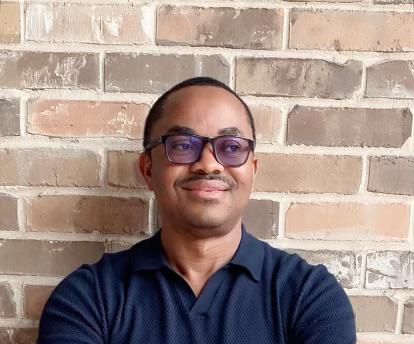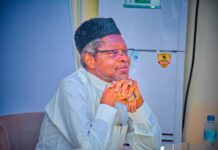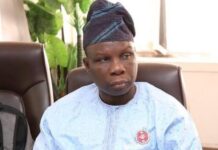Sim Fubara and the War Waged in Our Domot, by Osmund Agbo
This past Friday, under the cover of night, two truckloads of police officers, reportedly dispatched from neighboring Abia State, stormed into Port Harcourt. Their mission could have rivaled the infamous Watergate scandal of former President Richard Nixon. Acting on covert orders, their target was the Rivers State Independent Electoral Commission (RSIEC) office. Their goal? To break into the facility and seize critical election materials meant for the local government elections scheduled for the following day. But in a dramatic twist, Governor Siminalayi Fubara, the embattled leader of Rivers State, got wind of the sinister plot and refused to be a passive spectator.
The man swiftly mobilized his team, many of whom are key government officials, including the Chief of Staff to the governor, Edison Ehie, and the Speaker of the Rivers State House of Assembly, Victor Oko Jumbo, along with National Assembly members aligned with him. They gathered at the RSIEC office, and soon enough, a crowd swelled. Frustrated, the governor openly lambasted the Inspector General of Police, daring him to shoot. It was quite the spectacle, and like his counterpart in Edo State, this PDP governor isn’t just swimming against the tide; he’s facing a tsunami of opposition but determined to stand his ground no matter the cost.
In the farce that passed for the recent Edo State governorship election, the political godfathers handpicked one of their most obedient minions for the throne. After the coronation, APC national chairman and former Kano governor, Abdullahi Ganduje, gleefully announced that with their “victory” in Edo, the APC had perfected a blueprint to “win” future elections.
But this winning formula seems to have a clear route—through Louis Edet House. Godwin Obaseki, the governor who once stood defiant against his own godfathers just four years ago, seemed unaware of this shift in power dynamics. When he stormed the INEC office to challenge the alleged manipulation of the election results in favor of the APC’s Monday Okpebhollo, he was swiftly shown the door. With a steely glare, DIG Frank Mba, the officer in charge of the election, bluntly made it clear that Obaseki was not welcome.
Governor Fubara must now confront an uncomfortable truth: if his fellow PDP governor in Edo couldn’t stand up to the pressure from a mere Deputy Inspector General, what chance does he have against the Inspector General himself?
Nevertheless, the cabal may have gravely misjudged Fubara’s resolve, underestimating the force with which he could counter their schemes. Despite all odds, his proxy party, the Action Peoples Party (APP), secured a decisive victory, claiming 22 of the 23 chairmanship seats.
READ ALSO: The Paradox of Progress: Scraping by in a world of excess, by Osmund Agbo
This triumph occurred despite fierce protests from the Peoples Democratic Party (PDP) and the All Progressives Congress (APC), along with the conspicuous absence of police protection, withheld under the pretext of a Federal High Court ruling. However, it’s not yet Uhuru. Undoubtedly, the vanquished are tending to their wounds and quietly strategizing their next move. They are positioning themselves with their sights firmly set on the ultimate prize—Fubara’s seat. Biding their time until the next gubernatorial election, they are meticulously preparing to orchestrate what they envision as Fubara’s own “Edo treatment.”
The Inspector General of Police, Mr. Kayode Egbetokun, is not a man any sane Nigerian would willingly cross. As the head of the nation’s police force, he commands an institution where power flows directly from the barrel of a gun. And in a country like Nigeria, where raw power often speaks louder than the rule of law, Egbetokun and his officers have more than enough muscle to flex. If they decide you’re in their crosshairs, it’s not an exaggeration to say that few, if any, safeguards would prove sufficient.
But his true power doesn’t just lie in his control over the men in uniform. It stems from the foothills of Aso Rock Villa, with influence like the tentacles of an octopus that reaches every nook and cranny of government. In today’s Nigeria, Aso Rock isn’t just the seat of power—it’s the whole government, despite the illusion of checks and balances. It is inconceivable that Governor Fubara does not understand the nature of the fight he is engaging in; he’s in a proxy war with the true power brokers in the Villa. To thumb his nose at the Inspector General is to dare the invisible yet omnipresent hand of the man at the pinnacle of power.
Egbetokun, a 60-year-old native of Erinja, Ogun State, is Nigeria’s 22nd Inspector General of Police. His journey began in March 1990, when he enlisted as a Cadet Assistant Superintendent. Just nine years later, fate aligned, and he was appointed Chief Security Officer to the then-Lagos State governor, Bola Tinubu—a man he had met a year earlier and who, by his own admission, transformed his life. Egbetokun wasn’t exaggerating when he said that.
When Tinubu ascended to the presidency in May 2023, it was no surprise that he installed Egbetokun as Inspector General just a month later, replacing Usman Baba. But there was a hitch: Egbetokun was scheduled to retire last month, upon turning 60. For Tinubu, losing his trusted ally so soon wasn’t an option. So, a swift solution was crafted. The Police Amendment Act of 2024, designed to extend the IG’s tenure regardless of the civil service retirement age, was pushed through the National Assembly at lightning speed.
The bill passed all readings in the Senate without a single voice of opposition. When Egbetokun talks about who shaped his life and where his power truly lies, you’d be wise to listen.
This is not a man who just holds a title—his authority is deeply intertwined with the highest echelons of power. Fubara would do well to recognize that he is engaging Aso Rock’s first son.
When the Governor defiantly challenged Egbetokun to pull the trigger, he knew too well that the Inspector General had no horse in this race; he was merely a pawn executing orders from the powers that be. It’s no secret that Fubara’s estranged godfather has attempted to claim credit for the battles the young governor has fought since taking office. Yet we know this struggle extends far beyond his former boss. Despite all the bluster and bravado, the godfather’s political influence and financial resources pales in comparison to those of the incumbent, in a state whose monthly allocations dwarf those of many other states combined, regardless of the billions he may have pilfered.
Fubara’s tribulations are not about Mr. Loudmouth or the potential influence of the moneyed reprobate. No, the stakes are much higher: they revolve around who will wield power in Rivers State in 2028, a reality Fubara is acutely aware of. But what options does he truly have? He has made countless pilgrimages to Aso Rock, pledging to be a good boy and begging for the big Oga to hear him out, only to be met with unattainable conditions.
In such a precarious position, what does a man have to lose when he has been wrestled to the ground than to fights with every last ounce of his strength. That’s exactly what Fubara is doing. He knows that the Calvary is not coming. The only alternative is to surrender his mandate, retreat to his village, and hope he isn’t assassinated by thugs or imprisoned by the EFCC on dubious charges.
The truth is, Fubara’s fate is not unlike that of the rest of us, buffeted on all fronts and witnessing the relentless assault on our dignity by the politicians and our pretend leaders. It echoes the sentiments of a certain Nigerian man who, ruminating on this grim reality, posed a thought-provoking question:
“Now that we cannot remove bad leaders through the ballot and they refuse to resign, now that the military and police oversee violence and thuggery during elections, and now that the judiciary consistently endorses these electoral crimes, what is next?”
Like many Nigerians, I have no good answers to this vexed question. But as the late American memoirist and poet Maya Angelou once said: “A bird doesn’t sing because it has an answer; it sings because it has a song.” However, much like Sim Fubara, the real question is: what do we truly have left to lose by choosing to fight when we’ve already been knocked down and counted out?
Osmund Agbo is a US-based medical doctor and author. His works include, Black Grit, White Knuckles: The Philosophy of Black Renaissance and a fiction work titled The Velvet Court: Courtesan Chronicles. His latest works, Pray, Let the Shaman Die and Ma’am, I Do Not Come to You for Love, have just been released.
Follow the Neptune Prime channel on WhatsApp: https://whatsapp.com/channel/0029Va74ZvU2v1IqKByXoX3d
Do you have breaking news, interview request, opinion, suggestion, or want your event covered? Email us at neptuneprime2233@gmail.com
Follow the Neptune Prime channel on WhatsApp:
Do you have breaking news, interview request, opinion, suggestion, or want your event covered? Email us at neptuneprime2233@gmail.com





